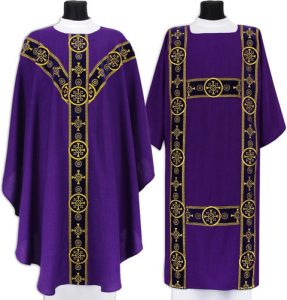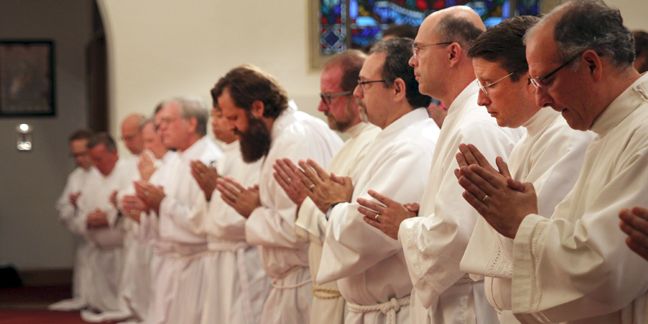So I’m Going to be a Deacon….
On April 14, 2018, God willing, I will be ordained a deacon in the Roman Catholic Church along with 14 other men with whom I have been sharing a five-year long formation journey. Our ordination Mass is scheduled for 10:00am at St. Mark’s Catholic Church in Huntersville, NC. The ordination is open to the public, and I invite all my students and their families to come celebrate with us.
Some of you may be wondering exactly what this means for our campus ministry. What, if anything, will change?
I’ll still be me…
In a lot of ways, not much will be different. I’ll still be your campus minister. And I’ll still be me. Nothing will change there. Our campus ministry program and schedule of events will continue as before, although you will notice some differences in our liturgies (more on that in a bit).
…but I’ll be a cleric.
But some things will change. The most significant change will be inside of me, and that will be the grace imparted through the sacrament of Holy Orders. This grace will not be for my own sanctification, but for the sanctification of others. According to the Catechism of the Catholic Church, the sacrament of Holy Orders “configures the recipient to Christ by a special grace of the Holy Spirit, so that he may serve as Christ’s instrument for his Church. By ordination one is enabled to act as a representative of Christ, Head of the Church, in his triple office of priest, prophet, and king” (CCC 1581).
The diaconate is one of three orders which constitute the Sacrament of Holy Orders; deacon, priest and bishop. The bishop has the fullness of the sacrament of Holy Orders and is a successor of the Apostles, with all the authority that entails. Priests and deacons are ordained to assist the bishop in his ministry, and are given a share of his authority, though in different ways. Priests share in the bishop’s authority to act as Christ the priest, whereas deacons act as Christ the servant. The word deacon means “servant” or “minister.” In other words, I will be an ordained minister, but not a priest.
As your campus minister, I will still be doing all of the things I am doing now as a lay person — teaching and counselling, providing spiritual guidance and sacramental preparation, managing our campus ministry resources and working with student leadership to plan programs and activities. But I’ll be doing all of that as an ordained minister of the Church, aided by the grace of that sacrament.
With ordination to the diaconate, I will legally enter into the clerical state (can. 266). This means a lot of things. For example, it means I won’t be able to remarry should my wife die before I do. It means I will be obligated to pray the Liturgy of the Hours every day. And I will be bound to obedience to the bishop in a more profound way than I am now.
Dressing the Part
Canon law stipulates that clerics are to wear clerical clothing (can. 284), although permanent deacons are not bound by this (can. 288). This is because many permanent deacons have full time jobs outside of the Church and wearing ecclesial clothing all the time would not be practical or possible. My full time job, however, is in ministry, and in the Diocese of Charlotte the bishop encourages deacons to wear clerical attire whenever they feel it would benefit their ministry. So don’t be surprised to see me wearing a clerical collar around campus. It’s not only a sign to students and faculty that I am a Catholic minister, but it’s also a reminder to me of my sacred duty to serve you.
Diaconal Vestments

You’ll also notice me dressing differently at Mass. The deacon’s vestment for Mass is called a dalmatic. It differs from the priest’s chasuble primarily in the fact that it has sleeves. It symbolizes the deacon’s role as a servant and assistant to the priest celebrant. Under this vestment, the deacon wears an alb and stole, just like a priest. But the deacon wears his stole a bit differently. Whereas a priest wears his stole over both shoulders, the deacon wears his stole over the left shoulder only. The stole is the symbol of ministerial authority, and wearing it only over one shoulder signifies the deacon’s lesser degree of authority.
Even outside of Mass, the deacon wears his stole, sometimes with a cope, when presiding over public prayer services or other liturgies, such as the Liturgy of the Hours, weddings, funerals, baptisms, or special blessings.
At Mass…
Speaking of Mass, you will note a few major differences in my role in the sanctuary. As a deacon, I will be proclaiming the gospel reading. And I’ll be preaching the homily from time to time, with Father’s permission.
It is also the deacon’s role to lead the prayers of the faithful and to distribute Holy Communion. I’ve already been doing these things as an acolyte and lector, so not much will change there. The difference will be that instead of doing these things as an extraordinary minister, I’ll be doing them as an ordinary minister who has been ordained for that task.
You’ll also notice I’ll be physically closer to Father much of the time. I’ll be sitting at his right hand next to the presider’s chair. I’ll also be standing next to him at the altar, assisting him more closely, especially with the chalice.
At Adoration…
As an instituted acolyte, I have been able to expose and repose the Blessed Sacrament for Adoration this past year. As an ordained deacon, I will also be able to offer Benediction at the end of our time of Adoration, which will add to the solemnity of our celebration.
Blessings
Deacons can bless things! While there are some solemn blessings reserved for priests and bishops, deacons can in most cases offer ordinary blessings. This means that I’ll be able to offer students a blessing at the end of our meetings and gatherings. I will also be able to bless sacramentals such as rosaries for you.
Weddings, Funerals and Baptisms
As ordained ministers of the Church, deacons can preside over weddings, funerals and baptisms. I look forward to being able to celebrate these special occasions with those on campus and in the parish.
What do we call you?
Some students are already asking — what do we call you after you are ordained?
The norm for addressing deacons in the western Church is “Deacon [Last Name],” although many deacons I know prefer “Deacon [First Name]” (which is the norm in eastern Churches). So you could call me Deacon Newsome, or Deacon Matthew, Deacon Matt, or just plain Deacon. I don’t really have a strong preference.
I’ve always been on very familiar terms with my students. As most students simply call me “Matt” now, I’d be very happy with just being “Deacon Matt” after ordination.
In formal address (such as if you were writing a letter), the proper title for a deacon is “Reverend Mister” or “Rev. Mr.” So, in my case, “Rev. Mr. Matthew Newsome.”
Informally (such as if you were writing a quick email), you’d use the tile “Deacon” or abbreviated, “Dcn.”
Whom Do I Serve?
Diaconal ministry is a ministry of service. But the question is: service to who? Because many deacons are active in what we might call charitable service or corporal works of mercy (hospital ministry, prison ministry, ministry to the homeless, etc) we might think deacons are called to serve those on the margins or those in need. And they are. But this is because of the call of their baptism not because of ordination. We are all called to serve the least of our neighbors.
A deacon is called in a special way to serve the Church. This means serving the bishop by assisting him in his ministry to the people.
Think of it this way: the clergy’s job is to be a minister of Christ’s love to the laity, and the laity’s job is to be ministers of Christ’s love to the world. This is why at the end of Mass, after we have been nourished by Christ’s Word and Body, it is the deacon’s duty to send the congregation off with a dismissal. There are a few ways the deacon may choose to dismiss the people, such as “Go forth, the Mass is ended,” or “Go in peace, glorifying the Lord by your life.” But they all have one commonality — the command to Go! Take what you have received here out into the world!
As a newly ordained deacon I look forward to serving my bishop, serving my pastor, and most importantly serving my God. I will do this by serving the Church, and that includes serving you. I ask for your prayers and patience as I transition into this new ministerial role.

